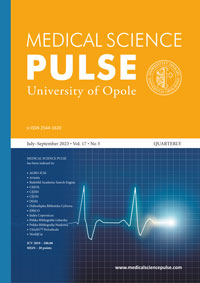RESILIENCE INDEX AND MENTAL STRESS OF NURSING STAFF WORKING
IN INTENSIVE CARE UNITS DURING THE SARS-COV-2 PANDEMIC
RESILIENCE INDEX AND MENTAL STRESS OF NURSING STAFF WORKING
IN INTENSIVE CARE UNITS DURING THE SARS-COV-2 PANDEMIC
Author(s): Daria Januszek, Ewa Kobos, Beata DziedzicSubject(s): Health and medicine and law, Welfare services
Published by: Uniwersytet Opolski
Keywords: NURSE; INTENSIVE CARE UNIT; RESILIENCE; MENTAL STRESS; MENTAL STRAIN; COVID-19;
Summary/Abstract: Background: Resilience, or mental toughness, is the ability to effectively cope in challenging circumstances. High resilience levels allow for faster adaptation in extreme situations. Aim of the study: An assessment of resilience, mental stress, and self-reported work environment among nursing staff in intensive care units (ICUs) during the SARS-CoV-2 pandemic. Material and methods: The study involved 102 nursing staff working in ICUs. Data collection used the Resilience Coping Scale (RCS-25), Meister’s psychological strain scale, and an original work environment self-assessment scale. Results: The overall mean score of the respondents on the resilience scale was 74.11 points out of a possible 100, while they scored an average of 24.36 points out of 50 on the mental stress scale. Staff working in hospitals converted into infectious disease sites (p=0.000) or in infectious hospitals with a third level of referral (p=0.012) assessed their working environment significantly better in the context of the coronavirus disease 19 (COVID-19) pandemic. Medical staff who worked longer at their current workplace, those with longer seniority in the profession, and those who were older scored higher in the resilience areas. The younger the respondent, the more mentally stressed they were in general (rho=-0.200), in non-specific areas (rho=–0.217), and in monotony (rho=–0.211). Those who did not feel well equipped with personal protective equipment showed lower resilience. Conclusions. Respondents were characterized by average resilience and second-level mental stress, while those with higher resilience suffered lower mental stress. We recommend organizing training to strengthen mental toughness, the identification of resilience factors, and the assessment of mental stress in the work environment in the context of the ongoing pandemic. The data obtained could be used to adjust working conditions during the next pandemic.
Journal: Medical Science Pulse
- Issue Year: 17/2023
- Issue No: 3
- Page Range: 61-70
- Page Count: 10
- Language: English

